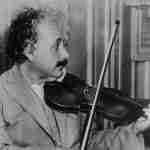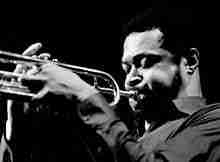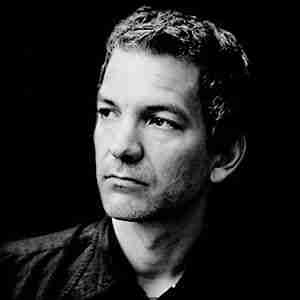You have to know the rules before you can break them. You’ve probably heard this well-intentioned phrase before. It’s as common and overused as “Practice makes perfect” or any of the countless other sayings that we encounter when it comes to learning a musical instrument.
As students of the music we get bombarded by these catch phrases on a daily basis. Teachers show us their personal philosophy for musical improvement, we take away quotes from masterclasses, books and videos, and even our friends give us helpful pointers.
Despite our best efforts, most of this information flies by us unnoticed without any tangible impact on our playing. But you don’t have to stop there, just dig a little deeper and you’ll discover that there’s some valuable truth behind those words:
“You have to know the rules before you can break them.”
If you find yourself stuck with improvising, this phrase can be a game changer. However to create growth, you have to begin by reading between the lines. What exactly are the “rules” and what does it mean to “know” them?
Anyone can hear this statement and think, “yeah, that makes sense,” but to take that message to heart and then apply it to your own playing takes a completely different kind of person.
What does it mean to Know?
Before I started high school I attended a week long jazz camp with about 30 other aspiring improvisers. Five days of big band and combo rehearsals as well as theory, improvisation and jazz history classes. On the very first morning of the camp all of the students were required to attend an introductory improvisation class.
As soon as everyone had walked in and sat down the instructor immediately jumped out of his seat and posed a question to the entire class: “How many of you know your major scales?”
It was a simple question and nearly everyone raised their hands right away. Know them or not, no one wanted to look left behind.
“Alright, pretty good, but how many of you really know your scales?”
A few of us continued to timidly raise our hands. I quietly thought to myself, “Well, I have all my scales memorized, I just have to think a little more on the hard ones, but I still know them.”
“No, no, how many of you know your scales?”
This time no one moved. It seemed like we were getting into trick question territory. Why does he keep asking the same question about knowing your scales?
Instead of waiting for any of us to answer, he picked up his trumpet and ran through every major scale up and down the horn at lightning speed. Then he started playing them in 3rds and 4ths, and in triads and arpeggios.
Point taken. In most of our young minds a scale was 8 notes in order and “knowing” that scale meant playing it slowly with some mistakes. However, without any words exchanged, we witnessed what it truly meant to know your scales. From that moment on the definition of “knowing your scales” was forever changed in our minds – the bar was raised.
That experience years ago was eye opening. Something as simple as a mental definition can make a world of difference. Once you think you’ve learned something you discover another level of understanding and proficiency. With improvisation, the sky is the limit. There is always another door that can be opened and new possibilities to be explored.
“The only source of knowledge is experience.”~Albert Einstein
When we learn something, especially in an academic setting, to “know” it means to memorize a fact and pass a test. However in music it’s a little different, the test of “knowing” comes in performance. You can either play it or you can’t. It’s no use if this information is stuck in your mind, it has to come out through your instrument.
Think about your own playing. Right now you have a definition in your mind of knowing a musical scale, knowing a ii-V progression, or knowing a jazz standard. But take a second and ask yourself: Do I truly know that scale, or progression, or tune?
Your definition of “knowing” becomes the pivotal point for your musical improvement. Most of the time we think we know a concept or have a skill when we haven’t even scratched the surface and this will hold us back.
“Knowing” the rules goes beyond retaining a simple definition, it means creating an internal knowledge from experience and practice, trial and error. The single reason that improvisation poses a great challenge for a lot of players is that they never get past the definition stage. They never get to the point that they “know” the actual sound of the fundamentals and can perform them.
What it means to break the rules
When it comes to the rules of conventional harmony, composers like Schoenberg, Webern, Berg, Ligeti and Stravinsky and numerous others have definitely broken the rules. But go back even further. Debussy broke free of conventional harmony, Beethoven started his first symphony on a secondary dominant chord, and countless others before them have paved the way for innovation with their music.
The same is true of Louis Armstrong, Art Tatum, Bird, Miles, Wayne, Coltrane, Ornette … or artists like Kandinsky, Monet, Matisse, and Picasso.
Breaking the accepted rules is an inherent part of all evolving art forms. A vital ingredient in discovering new possibilities and innovating on tradition. However in all of this innovation and rule breaking there has to be a deep understanding of the fundamentals. A study of what it means to pursue your art form, whether it’s the tradition of working with sound or the visual aspects of the space on a blank canvas.
I think a lot of people forget where the force of this music comes from. Eric Dolphy knew what he was doing. Ornette Coleman knows what he’s doing. John Coltrane wrote “Giant Steps,” which is a harmonic masterpiece. It’s like classical music. Can you imagine Arnold Schoenberg not knowing about Mozart and Bach? I ask a young musician, “Okay, play the changes,” and bam, he can’t play the changes. But on a free thing he can play his ass off. I can’t accept that. I had to go through it.~Woody Shaw
Musicians have been dealing with melody, harmony and rhythm for hundreds of years. There is an established technique for your instrument, a standard for producing a great sound. There are methods for understanding and manipulating time and rhythmic patterns. The relationship of melody and harmony has been rigorously explored and studied.
This adds up to a lot of musical traditions, so what exactly do we mean when we talk about the “rules” in music?
For the majority of us we immediately think of the rules of music theory: chord tones, scales, modes, ii-V’s and 7-3 resolutions. But as improvisers we need to look at the bigger picture – remember music is not just music theory.
As an improviser, there are also “rules” for time, swinging, rhythm, using language, and technique. A tradition of swinging and articulating improvised melodies. An unspoken lineage of learning and presenting this music. Being oblivious to the time is just as bad as not making the harmony and being unaware of the history…well there’s no excuse for that.
These are the “rules” we need to consider as improvisers. This doesn’t mean that we have to content ourselves with the past, rather that we should study the road that was paved before us. To familiarize ourselves with the possibilities that have been explored before by other like-minded musicians.
Understanding that the “rules” of improvising encompass much more than simple scales and chords will help you greatly in your quest to improve. However, as we’ve demonstrated, your definition of “knowing” makes all the difference. Take the music of John Coltrane for instance. It’s widely accepted that he broke the rules, innovating the music harmonically and rhythmically, but before he did that he spent years mastering ii-V’s and standards.
Rules really aren’t broken, because there are no rules, only perceived limitations and time honored conventions. There are however, skills and traditions that need to be learned and to improvise, these are essential.
Playing without rules
If rules are made to be broken, why even learn them in the first place?
The most innovative musicians should be the players that know no rules, right? Players that aren’t burdened by that box-like thinking that results from years of tradition and strict harmonic do’s and don’ts.
However this ironically is not the case. Take a look at young musicians that are trying to improvise for the first time. No listening, no language, little sense of time, articulation, technique or harmonic depth.
The pianis Brad Mehldau writes about this phenomenon in his article Jazz’s High Stakes and Tragic Failures:
True originality, and thus true creativity, never takes place in a historical vacuum; it is always rooted to something that has gone before. I remember observing the phenomenon of rootless “creativity” in my high school jazz band growing up. There were those of us who were listening to jazz and would go on to try to be musicians. Our fledgling attempts at soloing reflected whatever we had absorbed at that point – a little Bird, McCoy Tyner, Michael Brecker, what have you. Then there were kids in the band who were not going to pursue jazz for their life, had only a passing interest in playing music, and had hardly listened to jazz at all. They would also get a solo feature now and then.
What did they play? It was sort of like playing scales up and down the horn. What was striking was that they all sounded the same: One would think that with all the freedom that an improvised context could have, they might all play something different. But collectively, the kids who weren’t really listening to jazz actually encompassed a style of sorts, and that style was dictated by their limitation. The limitation was due to the fact that they hadn’t absorbed anything; they hadn’t begun to even mimic like we were. ~Brad Mehldau
To excel at and personalize a skill, you first have to learn the rudimentary elements of that skill. You can’t reasonably expect to create innovative improvised solos, without spending hours listening to records, learning solos, working out chord progressions, learning melodies and building your instrumental technique.
All of these aspects of playing are the “rules,” not just the right and wrong notes according to music theory. Every music has it own tradition and rules, but at the root of any music is the basic fact of a human interacting with sound.
Scientifically speaking, sound is defined for humans – it has been for thousands of years. With small variation, we all detect sound within the range of human hearing. However, how we define these pitches and group them into harmonies creates the different musical traditions we find around the world today.
Think of all this tradition and study, not as rule book of dos and don’ts, but as a toolbox of skills that you use to navigate harmony and melody and the sounds that we hear everyday. A trusted guide that helps to enable your musical awareness and creativity.
Studying these aspects of musicianship enable you to create the melodies, harmonies, and rhythms that you’re hearing inside of yourself. Knowing the rules really just means becoming proficient, acquiring enough knowledge and skills so that you can begin learning. We all have an internal creativity that can be unlocked, we just have to first learn how to use it.
Pay your dues
If you want to move forward as an improviser, if you want to get unstuck from the musical rut that you’ve found yourself in, and if you want to start learning you need to “know” the rules of improvising – not just the definitions.
The “rules” for improvisation aren’t the right or wrong notes to play, it’s understanding theory, acquiring technique, working on ear training, feeling time, listening to the history through records and knowing the jazz language. The rules of improvisation are the skills that you need to acquire.
To start, forget breaking the rules, start by knowing the rules. Maybe the the phrase should be: You have to know the rules before you can start playing. To successfully improvise you need a solid musical skill set and only after years of practice and performance can you start to think about breaking rules.
Getting to the point that you can break the rules in improvisation requires mastery. Take a look at the living masters of the music that we can hear today like Herbie Hancock or Wayne Shorter or Chick Corea. They’ve not only broken the rules, they’ve rewritten them. But, they’ve also paid their dues. If you hope to reach for similar heights with your music don’t just start by following the rules, make sure you actually know them.














